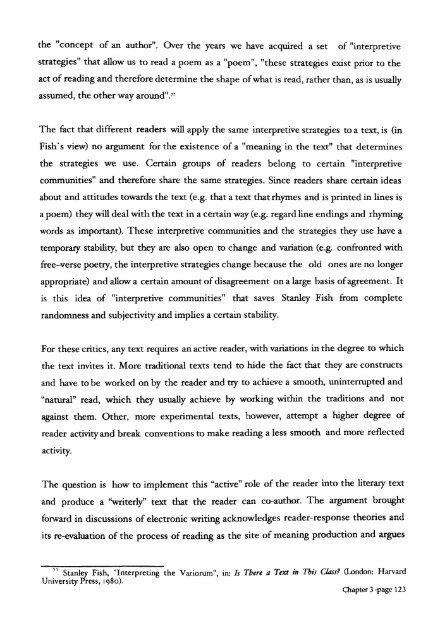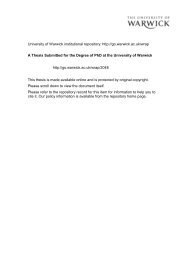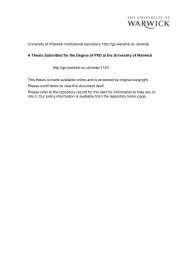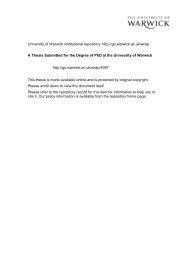From Page to Screen - WRAP: Warwick Research Archive Portal ...
From Page to Screen - WRAP: Warwick Research Archive Portal ...
From Page to Screen - WRAP: Warwick Research Archive Portal ...
You also want an ePaper? Increase the reach of your titles
YUMPU automatically turns print PDFs into web optimized ePapers that Google loves.
the "concept of an author". Over the years we have acquired a set of "interpretive<br />
strategies" that allow us <strong>to</strong> read a poem as a "poem", "these strategies exist prior <strong>to</strong> the<br />
act of reading and therefore determine the shape ofwhat is read, rather than, as is usually<br />
assumed, the other way around"."<br />
The fact that different readers will apply the same interpretive strategies <strong>to</strong> a text, is (in<br />
Fish's view) no argument for the existence of a "meaning in the text" that determines<br />
the strategies we use. Certain groups of readers belong <strong>to</strong> certain "interpretive<br />
communities" and therefore share the same strategies. Since readers share certain ideas<br />
about and attitudes <strong>to</strong>wards the text (e.g. that a text thatrhymes and is printed in lines is<br />
a poem) theywill deal with the text in a certain way (e.g. regard line endings and rhyming<br />
words as important). These interpretive communities and the strategies they use have a<br />
temporary stability, but they are also open <strong>to</strong> change and variation (e.g. confronted with<br />
free-verse poetry, the interpretive strategies change because the old ones are no longer<br />
appropriate) and allow a certain amount ofdisagreement on a large basis ofagreement. It<br />
is this idea of "interpretive communities" that saves Stanley Fish from complete<br />
randomness and subjectivity and implies a certain stability.<br />
For these critics, any text requires an active reader, with variations in the degree <strong>to</strong> which<br />
the text invites it. More traditional texts tend <strong>to</strong> hide the fact that they are constructs<br />
and have <strong>to</strong> be worked on by the reader and try <strong>to</strong> achieve a smooth, uninterrupted and<br />
"natural" read, which they usually achieve by working within the traditions and not<br />
against them. Other, more experimental texts, however, attempt a higher degree of<br />
reader activity and break conventions <strong>to</strong> make reading a less smooth and more reflected<br />
activity.<br />
The question is how <strong>to</strong> implement this "active" role of the reader in<strong>to</strong> the literary text<br />
and produce a ''writerly'' text that the reader can co-author. The argument brought<br />
forward in discussions of electronic writing acknowledges reader-response theories and<br />
its re-evaluation of the process of reading as the site of meaning production and argues<br />
77 Stanley Fish, "Interpreting the Variorum", in: Is There a Text in This Class? (London: Harvard<br />
University Press, 1980).<br />
Chapter 3 -page 123





